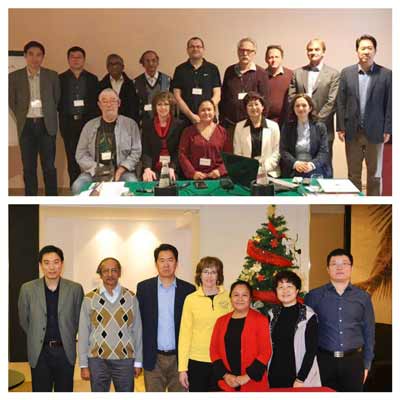 |
26 Nov 2018 Top photo: AMR/RA/AAH experts debate on risk of AMR in aquaculture
29 Nov 2018: Bottom photo: Experts from candidate FAO Reference Laboratory
for Aquaculture Biosecurity (inc AMR) from China, India and USA
Dr Richard
Arthur (Canada), Dr Iddya Karunasagar (India, Nitte University), Dr Peter Smith
(Ireland), Dr Rohana Subasinghe (Sri Lanka), Dr Olafur Valsson (Iceland, OIE),
Dr David Verner-Jeffreys (UK, CEFAS), Dr Carlos Zarza (Spain, Skretting),
Dr Patricia Gaunt (USA, MSU), Dr Jiang Lan (China, Pearl River Fisheries
Research Institute), Dr Wang Yingeng and Dr Zhang Zheng (China, Yellow Sea
Fisheries Research Institute) and FAO HQ Officers (Dr Melba Reantaso, Dr Hao Bin,
Ms Elena Irde) |
A meeting of an Expert Group composed of the following experts, namely: Dr R. Arthur (Canada), Dr I. Karunasagar (India, Nitte University), Dr P. Smith (Ireland), Dr R. Subasinghe (Sri Lanka), Dr O. (Iceland, OIE), Dr D. (U.K., CEFAS), Dr C. Zarza (Spain, Skretting), Dr P. Gaunt (USA, MSU), Dr J. Lan (China, PRFRI), Dr W. Yingeng and Dr Z. Zheng (China, YSFRII) and FAO Officers (Dr M. Reantaso, Dr H. Bin, Ms E. Irde), engaged in a scoping exercise to increase the understanding of the risks of AMR in aquaculture. Setting the scene with technical presentations (e.g. Recent global and regional initiatives to reduce AMR, Overview and current status of knowledge on AMR, AMR risk analysis for human medicine: the WHO framework and guidance, AMR risk analysis for aquaculture: the OIE framework, Observations on the OIE RA framework and CODEX framework, Oral delivery of medicines through aqua feed: AMR risk factors), the Expert Group performed a risk profiling of two important bacterial pathogen groups (Vibrio parahaemolyticus and Streptococcus spp.). The Expert Group was of the opinion that risk profiling as outlined in Codex provides a useful guidance, but it would need to be reviewed and adapted as appropriate for aquatic AMR RA. The risk profiling exercise for the above two bacterial pathogens revealed that in both cases, the AMR risks posed by these pathogens were likely to be low and thus conducting a full risk assessment was not recommended. Strain differentiation and pathogenicity as outlined in Codex are essential in understanding the AMR risks posed by bacteria affecting aquaculture production. Discussions on potential development of a proposal to contribute to a multisectoral project "Towards reducing aquaculture-based AMR through a cross-sectoral approach" followed. A consensus was reached to develop a project concept that will include Streptococcus spp. and mesophilic aeromonads as the bacterial agents for investigation, as these pathogens are important to both animal and human health. These two bacterial agents are important pathogens of tilapia, the second largest species group produced in aquaculture globally, which contributes significantly to global food and nutrition security. A short meeting of the FAO Reference Centers for Aquaculture Biosecurity (including AMR), participated by China, India and the USA discussed a joint work program that included activities within the pillars of the FAO Action Plan on AMR (awareness, evidence, governance and practices) including joint resource mobilization. The next meeting of the expert group is planned to be in China in mid-2019.
More information: Melba.Reantaso@fao.org